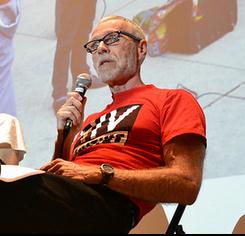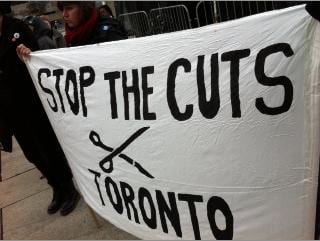
Ward 23 councillor John Filion. Credit: Courtesy AIDS Action Now

Tim McCaskell speaks at an AIDS Action Now 25th anniversary function. Credit: Andrea Houston
On the eve of World AIDS Day, Toronto City Council is considering putting the Global AIDS Prevention Initiative on the chopping block.
The proposed cut is included in the 2013 proposed budget summary, released Nov 29. The annual funding of $104,000 has been earmarked to Africa to assist local groups in HIV prevention, treatment and education. It was created as the city’s legacy to the 16th International AIDS Conference, held in Toronto in 2006.
Ward 27 Councillor Kristyn Wong-Tam plans to fight the cut. She says there should be no reduction in the city’s funding to any HIV/AIDS programs.
“Any reduction to the AIDS prevention envelope should be fought with resistance,” she says. “I don’t believe we should be cutting this . . . We should all fight that. We need to take a stand. If we reduce this, what else is next?”
She calls the proposed cut part of the city’s “war on the poor.”
“This war on the disenfranchised needs to stop . . . People are hurting. This council needs to recalibrate its values.”
Wong-Tam says the money, which comes from the city’s AIDS Prevention Community Investment Program (APCIP), funds various initiatives in the fight against AIDS in Africa, such as palliative care, efforts to engage young people in HIV prevention, sexual health education and removing the stigma surrounding the disease.
“Other initiatives coming out of this very small amount focus on trying to empower young women and build civic engagement with government,” she says. “The funds are significant in terms of impact it is having.”
She also says the funding allows the city to take a very public profile on this issue and work in partnership with other cities taking steps in the global fight against AIDS.
“We must reach out internationally. This is a disease that has no border. This is a global pandemic,” she says. “After we hosted the International AIDS Conference, this was our pledge. This is the legacy of that. For us to go back onto the international stage and tell the world we cut the funding in 2013, that doesn’t demonstrate forward thinking.”
The Global AIDS Initiative is the only international funding included in the APCIP. The city budget is $9.4 billion.
“You know, for $104,000, it is doing fantastic international solidarity work,” Wong-Tam says.
Councillor John Filion, chair of the Board of Health, says the board agreed to the proposal, which came from Toronto Public Health.
“Well, we had to make cuts. This program was vulnerable to a cut because it’s not part of our mandate and it’s not one of our cost-shared programs,” he says.
Unlike other Board of Health programs that are mandatory and cost-shared by the province, the Global AIDS Initiative is funded 100 percent by the city, Filion says. The province pays 75 percent of mandatory programs.
Wong-Tam says she will suggest that the funding be diverted to a local initiative, like the Stephen Lewis Foundation. Filion says a replacement is not being considered. “If we approve the budget, it will be gone,” he says.
“[The fund] was for work outside Toronto. It’s not that it wasn’t worthwhile . . . We have to scrutinize our budget. We’re sorry to see it go. We would continue to fund it if it were not for a budget squeeze.”
Filion says he has to fight to keep funding for local AIDS programs. “We have struggled to maintain funding for AIDS prevention in Toronto.”
AIDS Action Now’s Tim McCaskell rejects Filion’s suggestion that a local program would be at risk if the initiative were saved. “It’s always this or something else. It shouldn’t be either or.”
“We know the situation in Africa is really dire,” he says. “It’s not just a matter of getting drugs into people. Twenty years of AIDS there has changed the demographics. That’s why grandparents are raising children. Any removal of funds further exacerbates those problems and has cascading results.”
There are about 23.5 million people living with HIV in sub-Saharan Africa, according to amfAR, the American Foundation for AIDS research. Every day nearly 7,000 people in the world contract HIV — that’s 300 every hour.
“Someone should go over there and take pictures of the faces of those who benefit from this program,” McCaskell adds.
Meanwhile, on Nov 28, the federal Conservatives defeated Bill C-398, a private member’s bill that would have reformed Canada’s Access to Medicines Regime (CAMR) to make it easier to get Canadian generic medicines to developing countries, like those in Africa.
“We could talk about the implicit racism in both these attacks on Africa,” McCaskell says. “The city’s fiscal questions are more important than the lives of black people.”
Deputations for the 2013 budget will be Dec 10 and 11 at Toronto City Hall. Contact the budget committee at 416-338-5851 or 416-392-7445, or email buc@toronto.ca no later than 4pm on Dec 7 to make a public presentation.

 Why you can trust Xtra
Why you can trust Xtra


